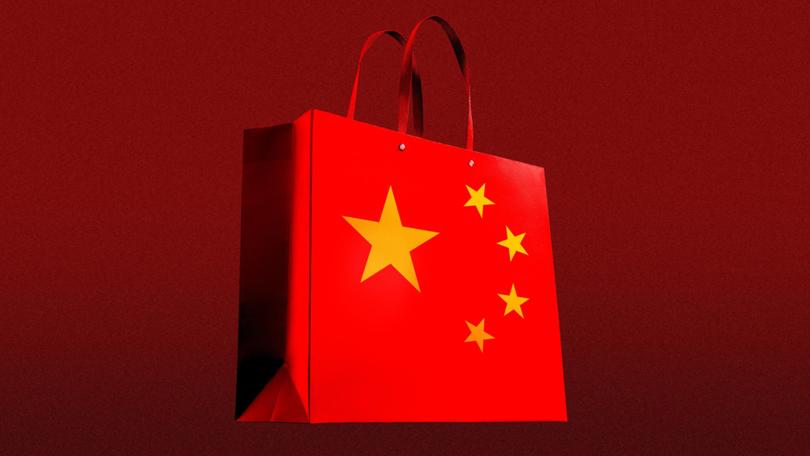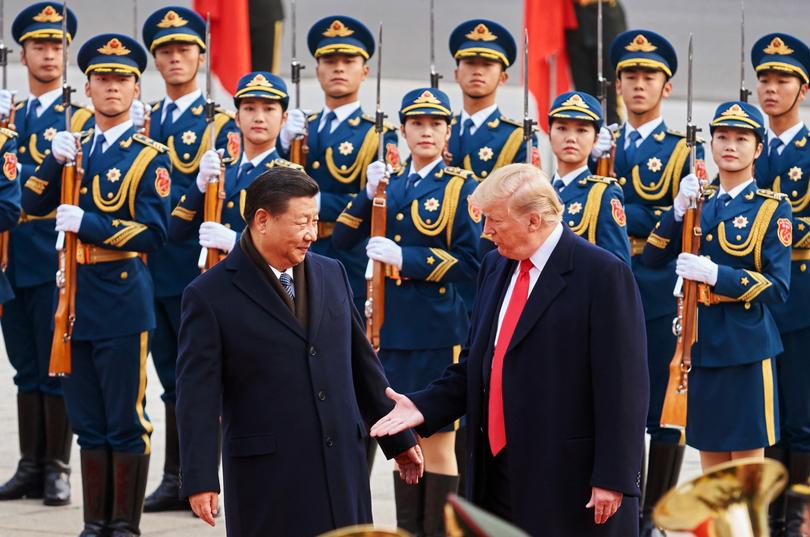JACKSON HEWETT: China’s plan to turn its 1.4b citizens into greater consumers and boost home-grown profits
JACKSON HEWETT: While Donald Trump continues to vacillate on tariffs with America’s nearest neighbours, China is firmly in the administration’s sights.

With its back to a tariff wall, China is going all in to keep its economy moving.
The country, reliant on global buyers to purchase the $US1 trillion worth of goods it exported last year, is now facing an existential threat.
While Donald Trump continues to vacillate on tariffs with America’s nearest neighbours, China is firmly in the administration’s sights.
Sign up to The Nightly's newsletters.
Get the first look at the digital newspaper, curated daily stories and breaking headlines delivered to your inbox.
By continuing you agree to our Terms and Privacy Policy.Since coming to office, the President has ratcheted tariffs on Chinese imports, potentially severely restricting the largest consumer market in the world.
While Mr Trump was addressing the US Congress, China’s leaders sketched out a vision for “vigorously boosting consumption” in order to hit a mandated growth target of five per cent.
There is some heavy lifting to do. Unlike other developed nations, consumption makes up about 40 per cent of gross domestic product (GDP), much lower than the 70 per cent in places like the US. Instead, the economy is highly geared to exports, with investment, including for the manufacturing sector, twice the size of the US at 40 per cent.
There was little in the way of detail in the edict to the People’s National Congress, meaning the jury is out on whether China can wean itself off an export-led economy and turn its 1.4 billion citizens into greater consumers.
Something is needed. Despite an official 5 per cent growth target last year, the RAND Corporation estimates actual growth was closer to 4.2 per cent, putting it below its pre-COVID trend. Household consumption of goods and services is even slower, as citizens feel the effects of a massive contraction in the property sector, which at its peak accounted for a quarter of GDP.
Youth unemployment had risen as high as 20 per cent, and highly educated graduates have been refusing low-paid jobs, earning them the label “lie-flat generation” as they opt for leisure over undesirable work.
The one thing that had kept China going was its export sector, contributing the largest share of GDP since 1997.
With US tariffs about to strike at the heart of China’s economic engine, Dr Jenny Gordon, non-resident fellow at the Lowy Institute for International Affairs and former chief economist at DFAT, said that any balancing of the Chinese economy would be good for the global economy, “which would be good for Australia,” but she worried that it would do little in terms of directly helping Australian companies.
“The big infrastructure spend is over,” Dr Gordon said, compounding the challenge for iron ore exports that will also be hit by a restructuring of the steel industry.
So what Australian industries can benefit from a pickup in consumption?
Michael Harvey, senior dairy and consumer food analyst at Rabobank, said China’s economy had been struggling for some time when it came to food spending.
“China was a very problematic market for a lot of fast-moving consumer goods companies and global quick-service restaurants because of the state of the China consumer. There was sluggish foot traffic and reduced spending across a lot of these discretionary food categories, and that comes through in the data,” he said.

A stimulus package announced late last year was starting to create some positive momentum, however.
“There were some signs of recovery late last year, and an expectation that things should gradually improve this year, with the hope that if there is more stimulus, that will add to the recovery,” he said.
“If there is more stimulus, that will add to the recovery. But the overarching theme is that the health of the Chinese consumer is still under a little bit of pressure.”
Mr Harvey expected that there should be some support for red meat exports, as Chinese diners switch out from cheaper restaurants and dining in, and dairy sales should improve as more consumers head out to cafes.
A China stimulus might also have a ripple effect across the region, Mr Harvey said, which would support Australian exports.
“If the China economy is going better, it will be better news for the Southeast Asia economies, because that is a complementary story. Food and beverage market performance in many Southeast Asia economies has been pretty weak in the last 18 months, which has a knock-on impact for animal protein and dairy consumption patterns,” he said.
Last year, wine shipments to mainland China surged by 6000 per cent to 84 million litres, up from just 1.4 million litres in 2023 when the industry was hit with anti-dumping duties. By value, winemakers exported $900 million worth of wine, but that is down on the $1.3 billion at the height of the wine boom.
Dr Gordon said there may be some room for growth at the top end of the market, but it will be hard to return to dominance of the past.
“Selling wine is far more competitive due to the market’s closure,” she said. “Australia built that market, and now other countries are taking advantage of it.”
Albert Tse, founder of private equity firm Wattle Hill Capital, and an early investor in China-focused companies like Bubs, which he exited in 2020, and Capilano Honey, said that this round of stimulus would focus more on encouraging Chinese consumers to buy home-grown products, particularly consumer durables, that had advanced enormously in terms of quality.
“Once upon a time, you were competing with Chinese brands that are lower in quality. Now, you are competing with a Chinese brand at pretty good quality. It’s definitely harder, and I think the era of the Chinese consumer delivering outsized returns for foreign companies is over,” he said.
The health and lifestyle boom that served Australian companies like Bubs and Swisse had also fundamentally changed, Mr Tse said.
“The government has cracked down on quality and food safety, and people are increasingly buying local,” he said. “Of course, there will be people who, from a food perspective, will always try to buy imported, but I think overall, that whole extravagant ‘look at me’ culture has shifted to a more low-key mindset.”

